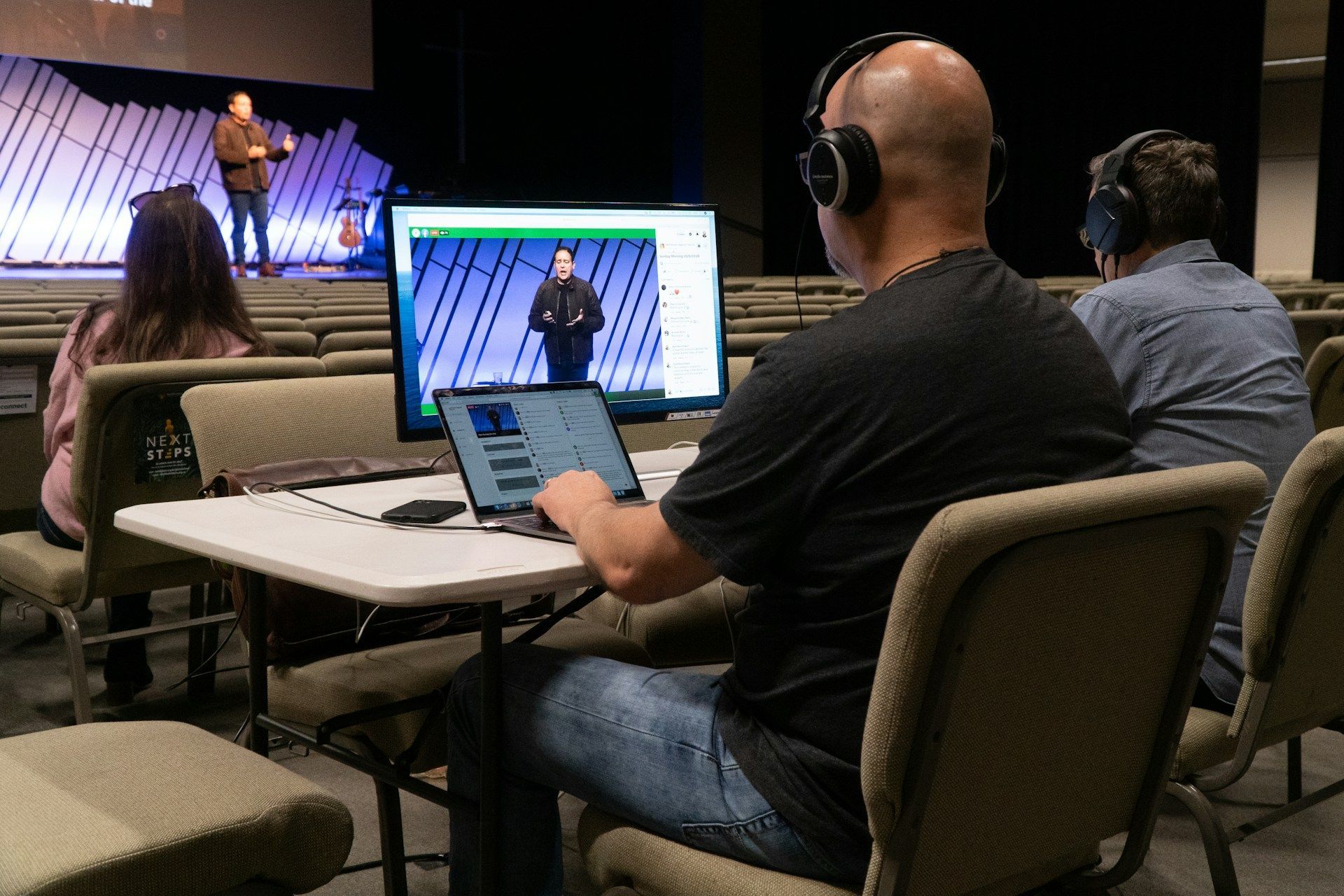Leadership Life Support
WEBINAR REPLAY
TRANSCRIPT
Jono: How are you this morning?
Neal: I'm wonderful. We had neon night last night and it actually turned out pretty good.
Jono: I just got in from Miami last night.
I was in Miami for a nerd convention. Well, bunch of nerdy guys that do what I do.
Anyway, thanks everybody for joining us now that we're up and live on Facebook and the YouTubes and wherever else this is streaming. Those of you joining us on Zoom or listening to this on the podcast. Appreciate you being here. I'm Jono with Faithworks Marketing, and we help Churches get their online presence right. Website, search engine, and we help with the Google grant and social media.
So lots of cool things there, but we like to help Churches. At the end of the day, we want to see Churches grow and help grow the kingdom in any way that we can. We also realize that that's not just all about online stuff. I like to have guys on here, like my good friend, Neal, who are in the trenches every day.
And of course, you know, back to me back to about myself. I was in the trenches for about 21 years. As full-time Youth Pastor, and actually Neal Dose here, who's now the Family Pastor. When I first met Neal back in June of 2012, it's been 10 years.
Neal: Wow, that's crazy.
Jono: This brotherhood, this love for one another, just started blooming. But Neal was my intern and not a very good one. Well, you weren't really, my, you were an intern.
Neal: I was an intern.
Jono: I don't know what I was kind of the interns' intern. Yeah, you were good. So anyway, Neal is the Family Pastor down at Eagles Landing First Baptist, McDonough Georgia. I'm sure everyone knows where McDonough is, right?
Neal: Where bad traffic is, on 75.
Jono: Yeah. South of the airport in Atlanta. So tell us how things are going. You were talking about neon night that you did with the students there at Eagles Landing.
Neal: I mean, things are good. We had a crazy summer, but it felt like, probably for us, the most normal summer since 2019, really. So we sent three teams on mission trips. We sent like student teams, we took a couple hundred kids to camp. I don't know how many it was, we do a little kids camp. That's a little out of the box thinking not VBS, but something different. We call it Camp 323.
We did that. It was, you know, between kids and volunteers and little babies. There was like a thousand people, on campus. And it was insane. So we sprint in the summer and we stopped for water last week during July and then pick the pace back up, because we're about to start school back.
So had a big leaders' lunch this past week with current leaders, new leaders. We're actually about to start using Planning Center across like all platforms, which is beautiful.
Jono: You're going to love it. You're using Planning Center for anything right now?
Neal: We have Planning Center services that we've used.
Jono: Planning Center services is awesome, but wait, till you use Planning Center events, it's amazing.
Neal: Alright. They're kind of slow rolling it out. So we're starting with groups and checkins and people and then services.
Jono: People is kind of the hub the best, I think and I've used all of them. I think my favorite one of the whole thing, but specifically, because I think it was the most helpful with student ministry, but was registrations or events, I guess it's called in the app. There was two things that I loved about it.
One was like, you could have everyone sign up for summer camp or your disciple now weekend, weekend retreat, and you could hit a button. Like, once you assigned everybody a gender and a grade and all that stuff. You could hit a button and tell them how many rooms you had and how many people could be in each room and it would split up your rooms and mix it up.
And it was just, it was a beautiful thing and I was terrible with spreadsheets. This may not be as wonderful as it maybe to like someone, a little more tech savvy, like you, even though.
Neal: I couldn't get my Bluetooth headphones to work on my computer, so I'm not sure, and I'm getting text messages on my computer and my iPad and my phone, and none of them are going to the same place.
So I'm not that tech savvy.
Jono: I take it back. I'm not good with, I hate spreadsheets, and we had an organized system of like, when t-shirt orders came in, I would just kind of be like, ah, yeah, we need 20 smalls, 20 mediums, 20 largest, 20 extra, you know, whatever. But the events app in Planning Center, and we're not sponsored by Planning Center. Maybe we should.
Neal: We should be.
Jono: But you could just pull up your t-shirt order and it would pull in your t-shirt order. You could literally just email that. Cause first thing the t-shirt company wants, you know, alright, send me your sizes and we'll get these in production.
Hold on. Let me count. And then four more kids would sign up. So dude, it just had this cool little, give me my t-shirt order, or any custom build that you came up with. So you're going to love that.
Neal: I'll call you when we dive in. So yeah, this past week we had that, we had like a, you know, Hey, these are our expectations. These are what we're looking for. And we just kind of cast the vision for the new year. Later, we have a crazy blessing at our Church. We've got some long tenured leaders you know, 15, 20 plus year leaders inside of our ministry. And inside of like the family ministry as a whole.
But then we've also got some people that are like, you know, I'm wanting to serve. I'm wanting to get out of my seat and begin to do something on a week to week basis. You've got two widely different people in the room. So it was a lot of fun. Just kind of getting those people connected, casting vision, re-casting vision to some people and trying to get some movement within the ministry as a whole. Yeah, it's good. I mean neon night last night, so, by the way neon duct tape does not light up under black lights apparently.
Jono: Oh, really? It's missing an ingredient or something.
Neal: I have no clue. I had my intern spend a lot of time duct taping things. And we turned the black lights on and I'm like.
Jono: You're just ready for this big reveal, like hey guys here it comes, here it goes.
Neal: I felt so bad. She left midway through the event, and I think it was because she was so disappointed that some of the stuff she spent so much time on didn't work. She was like, do you mind if I just leave? I was like, yeah, we got it.
Jono: So you mentioned leadership, which kind of brings us to what we're going to talk about today and because, well, there's so many aspects of leadership, but if you don't have good leaders in the Church and you don't spend a good bit of time raising up some leaders and training your leaders, then you're going to have struggles.
And I think one of the things that when I served when, I was on staff at Eagles Landing there, and it was only a short time. It was actually a year to the date. I probably shouldn't admit that, but oddly enough, some of the closest friends I have and people I'm still connected to were from my time at Eagles Landing.
Neal: It's because we're so great.
Jono: Yeah. Really and truly. So let's see, I went into ministry, I started on staff in like 1999. When I got to Eagles Landing, I've been in Church staff life 13 years. I believed in leadership. I had a student leader team. Had a adult leadership team for the youth ministry.
Did everything I could, read leadership books. There were no podcasts at the time, so I didn't listen in to leadership podcasts, but did everything I can. Went to the conferences. And man, I would try to have just a monthly adult leadership meeting or training or something and I was lucky to get 50% attendance and then, you know, there were times where I tried to do like a every other week thing.
And that never worked. I just felt like, always felt like I was pulling teeth and I got better at it and got better at producing community among the adult leaders and stuff. But still, I just never felt like it was something I just really conquered. And then I got to Eagles Landing and I remember the first time, like we had, it was every other Sunday night after Sunday night stuff. There's a lot of things that went on on Sunday nights. But every other Sunday, we had like a meal with the adult leaders and everyone, and it was leadership training and planning. And I remember that first one, like everybody wanted to be there, which blew my mind. Because I was thinking, no one's going to show up.
And almost everyone showed up. Everyone was happy to be there. We weren't like begging people to be there. No one sat there looking at us like, oh my gosh, will you please hurry up? In fact, I remember thinking. Oh, my gosh, these people are never going to stop talking. I'm ready to go home.
And it just kept on going. You guys had created, and obviously I wasn't responsible for it. Didn't have anything to do with it, but I learned a lot. Anyway, anything to say, how you guys have created a culture where leaders want to be around, you said they stick around long term.
You've got a lot varsity, long term leaders there so how do you do it? How do you pull that off?
Neal: I mean, that's culture that started long before. Started when I was a student for me. So, you know, you're talking when you walked into that, that's not something that I created, so I can't take credit for any of that.
Jono: But you've been immersed in it for long enough now.
Neal: Yeah. It's culture, man. It really is. I think one of the best things and I think something we've tried to carry, you gotta give people something worth coming to. And I think as much as leaders want to lead. I think leaders also want to be led too. When you're leading people to something and reminding them and continually casting vision, you're reminding them of these are celebration stories. You're giving them ownership. Like in our student ministry, one of the things we always try to do is get kids out of the chairs.
And it's the same thing with our leaders. I need my leader out of their small group on a Sunday morning, I don't need them just teaching a small group. I need them owning the ministry because I can't do it on my own. There's different gifts and things. You know, there's a lady on our student team and her role has actually morphed over the past couple years.
And we'll talk about some of this, you know, figuring out roles for people, you know, you have people that have gifts and you can try to square pack somebody into a round hole. They may do it for you and you and the Church and the ministry may not be getting out of people, what they have to offer.
And I think that's a disservice to not only that person as a leader, but to the Church and to the kingdom. So go back to this person. She works at Chick-fil-A and like super crazy when it comes to like just hands on activities and teaching things and helping build culture. So she was a life group teacher and a fantastic life group teacher for us, for students. And I came to her and was like, hey, like what if we did this? And she was like, if you told me I could do that, instead of doing this, I would jump on that all day long, because that is what I'm passionate about. That is what I love. And it was an out of the box idea, not something we had ever done before.
But it was something that she's passionate about and it's something that created like good movement within our ministry. I could go into detail about that, but I don't think that's why we're here, but the point being she has her hands to the plow of ministry within our Church, more than just in life group.
She's thinking about these things at home at night, she's thinking about these things when she's away or even at work, how could, what I'm doing at work. How could I bring that into the Church and how can, what I'm doing in the Church? How can I take that to work? That's the picture of a disciple?
That's the picture of somebody living on mission every single day. And I think as leaders, I think we have a responsibility to help draw that out of people. And when you do, I think it really does create some good movement and momentum within your ministry. So we don't just, for me, one of the things I've learned is honestly took some, for me, it was a pride issue. I only, and I'll say this gently, but I really just viewed people like, can I get them into life group to teach? Because I have a need. I need somebody to teach sixth grade boys.
Jono: And some of that is like, you've got your important programs that you want to do well.
That's what you're trying to say? Some of it is, this is a big deal in our Church culture, life groups are a huge deal and that's the pressure. And I've gotta get those filled.
Neal: Then go to a meeting on Monday where they're going to ask me, hey, you got all your leader, you know, and it's not like a, hey, can I help you?
It's a, you better have all these people, you know.
Jono: But you've got these people that are hanging that could do something, but they're not, they don't want to sit there. They're not a teacher. They're not a small group leader. That's just how they're wired and everybody can't be a life group leader.
So, yeah you gotta take a risk there and open up some other opportunities and that's a pretty good lesson.
Neal: So in COVID when COVID hit, it really was a good reset for me and a really good learning thing. I was able to reevaluate a lot of what we were doing. And honestly, pretty introspectively looking and say, man, I'm really just trying to fill space.
And that's what I'm looking for. So for me, I had to kind of reset and evaluate, all right, these are my on ramps for my leaders. Realizing man, some people aren't going to be teachers, but they be an incredible recreation guy in the pre hang for students. So I just need to go ask this guy to like, hey bro, will you set up kickball or set up nine square, whatever it is, and go play this game with these kids and he's all about it.
Well, now he's coming into the student ministry. So like this is a literal story. This guy comes in to help out with I think it was actually first touch with us as far as he went to camp with us and served at camp and just was really just kind of like a security guy. Like he was a presence in a room and he helped me with recreation.
He got back and started helping on Wednesday nights with the rec stuff. Set up kickball, whiffle ball, you know, just basketball, games for 30 minutes before. Nothing structured, very whatever. And now this fall, he's going to be teaching a life group. Actually, let me rephrase. He's going to be co-teaching a life group, so he's not even owning the whole life group.
So we onboarded him with an event with camp and he's slowly just gotten more and more hands on to the ministry. To me, that's become my new, some people are going to come in and say, hey, I want to teach life group. And you can just plug them right in, but others, man, you gotta create some good on ramps for them.
Jono: People who maybe newer Christians and didn't, you know, grow up in Church. They don't know that that's the option. And the other thing, not to interrupt your thought there, but kind of made me think of how I had a pastor that shared with us, and this was a really good something that stuck with me, but he talked about like, you know, we've overlooked a lot of people who are pretty like high capacity people at their job.
And then they come to Church on Sunday. They come be a part of our Church and one, we don't even know what they do. We haven't asked them or gotten to know them well enough to know what they do out in the real world. And these people are fairly important. Doing some big stuff at their work. And then they come here and those kind of people, they're not going to push their self on you.
They're not coming in talking about how awesome they are. Hey, let me do this. But if you don't figure it out, those people also don't want to just sit around and do nothing. If you don't find a way to plug them in and let them use their gifts and abilities and skills, then they're going to take off and go end up somewhere, that will let them, but figuring out giving them opportunities to test things out and learning who they are, that's tough.
Neal: Yeah, I think we're talking like three keys, and there's 150 of them. The three that I would say have, and I'm so like I turn 32 next week. I'm not a old seasoned veteran.
I have been at Eagles Landing for nine years. As a full-time guy. I've been on staff as an intern here, I don't even know 2009. So whatever that is, 13 years, 14 years, something like that.
Jono: Been under some of the best.
Neal: Yeah, it was one of the best years for learning how to not do things that I ever had.
So for me, there's a confidence level too, that I've grown in. I would say when you left, I think, and I stepped into a bit more capacity role. I was 23, 24. Man, I didn't want to go up to a 40 year old man and ask him to do something or tell him like, hey, this is how we're going to, it was hard for me to steer the ship.
So I've learned and grown in that. And as I've learned and grown in, what I would say is not being afraid to ask. So key one let's say I need to make sure I have good on ramps. I need to make sure I have good ways for leaders to step into my ministry. If the only way is a high capacity life group teacher, whatever I'm not going to be getting a lot of people. So you're going into a new season and you may not fill the role that you need right now, but you need to create an all ramp to get a guy that you can train up to fill that role in six months a year, whatever it is like you gotta have a little bit long game in mind. So that would be key one.
Jono: So, real quick, not to put you on the spot, but what are some of those on ramps and not just in student ministry, but just across the board. Can you give us a couple examples of some things for adults particularly?
Neal: Yeah, so we actually just started a volunteer orientation. So you're interested in serving, and the first thing we're doing is sending you to this volunteer orientation, which happens during our life group time. And people are going to hear kind of who we are as a Church, not membership stuff, but like culturally. And what we're trying to do that day is get them to say, this is what I'd be interested in and get them that day connected to that ministry in some way, whether it be to shadow to look so, that's a new OnRamp. I think you gotta think through like just some easy wins for people. For me, like a greeting team, like, hey, you can go to adult life group. You can still go to service, but come at this pre hang time and just help me take attendance, help me group people help me, you know, pass out donuts or you know, wave people with a flag to park cars, whatever. Like you need some good on ramps for people.
Jono: Valet the family pastor's car, keep it washed, waxed, clean.
Neal: My shirts need to be pressed. So like things like that, like you've probably already got some of those things built into your daily and weekly rhythms for your Church.
It's a matter of just realizing that's an easy place for me to get somebody to go serve. I just need to think strategically it may mean me pushing someone away from my ministry for a moment, for a month, six months with the idea that I'm going to on ramp them here so I can on ramp them into a different role in my ministry.
There may be a different ministry. That's doing something better than you that can train better than you can. So you need, you know, maybe you want somebody to do guest services in your adult ministry and the student ministry's killing it. So why don't I send this person to student ministry to learn how they're doing it for six months so that I can bring them back into adult ministry to recreate what we're doing here.
Makes sense? You have to start thinking, how am I on ramping people? And it can't just be into a high capacity role. I've gotta have, just some very base level things.
Jono: Yeah. And we've always, I'm assuming you have, I think we've all been burned by throwing someone into a position that even you thought they were perfect for.
They even had experience in, they got in there and for whatever reason, it just was a terrible, terrible fit. Then you had all this, you know, then there's tension. You've gotta have some difficult conversations you could have avoided had there been a good on ramp system where they could have explored, been exposed to some different ministries.
Cause we've also had the, like this person that wanted to serve with students. And then we realized, oh, you'd be way better with kids or this person wanted to sing in the band, but they're awful but a great teacher, you know, and there's gotta be an environment where you can evaluate people too.
Neal: I think some of that comes from just being, again, not just filling a space, it's a lot harder to unrecruit a volunteer than it is to recruit a volunteer. It's a lot harder to get somebody out of a bad role in Church world, without hurting somebody's feelings, without damaging, burning bridges, all that kind of stuff.
It's so much harder to do that on the back end than it is on the front end. So that would be my first tip. My second tip would be your key, whatever you want to call it, something we've kind of alluded to. You've talked about high capacity leaders. I think just leaders in general, key would be, I can't be afraid to ask people to help.
Meaning my own people, but also new people. So I've seen this play out. I had a leader she went on a mission trip with us, for her first mission trip over the summer. And she had moved here from a different town, was going to an adult life group. And she began to kind of feel this pull, this tug to do something different to begin serving.
I had been watching her. She had been leading worship. She was a really good singer. She had been leading worship on stage and I just really appreciated her passion. And I was like, I just need some people that worship, like she does around my students. I texted her called her one day and was like, hey, do you want to come meet with me?
And I just said, hey, I'd love to have you in student adminis. And I have no idea what's going on in her mind. And she has no idea really what's going on with me. The reality is the Lord was just kind of working in both of us. The Lord was opening my eyes to her gifts and her passions and her abilities while at the same time, drawing her heart towards something new as far as serving.
For me, she was just waiting for someone to ask her. I have this sense of, I need to ask this lady about serving. I did, and so, you can't be afraid to ask people to come be a part. We had a couple go to camp with us this summer, and it was one of those things where they kind of wanted to go and they were just waiting on somebody to ask them. And I don't think they would've gone, had someone not asked them. I just randomly, I saw her and her husband they were like at Church service one day and they, you know, great family. I was like, hey why aren't you guys going to camp?
You need to sign up to go camp. You don't have to be leaders of camp. And it was like, okay, we're in. So like there's people sitting all over your Church, walking next to you every single week that what's going on in them is, I really just need to, I want to serve. I just don't know where, and you just need to ask them, you can't be afraid.
I think we are afraid to ask people to, to help us because in our mind, as a paid ministry leader, I need to be doing it. This is what the Church pays me for. And man, like the people of the Church, like you're robbing them of opportunities to lead and to serve and to build the kingdom and build the Church.
Jono: Well, and while you were saying that I was thinking about how when I left Eagles Landing, actually there was a brief year where I worked for a orphan ministry, a nonprofit. So I didn't leave Eagles Landing to go to another Church. I left to do that and was working part-time for Apple at that point.
So that was the only time in the past 21 years there was just that little from 2013 to 2014 that I wasn't full-time staff member at a Church. We did a couple Churches. We landed at a Church in our community. We knew people there. And I had been somebody, had always just served and jumped in whatever, but I also was on staff and it was just comfortable for me and it was expected, whatever, but I remember becoming a civilian and here I am, you know, 2013, I'm a dude with about 14, 15 years of ministry experience.
And I'm now visiting a Church. And I remember one day at lunch telling Heather, like, man, why is no one asking me to do? Which is not as much on them, like I should have gone to them and been like, hey guys, I'm here. I could help. Let me know where you want me to help.
Neal: Those people are becoming rare and rare within a Church. Those people used to be there all the time and they are becoming so much rare. I think.
Jono: Yeah, exactly, and if a dude that had a seminary degree and has served in Church's entire life.
And, you know, 14 years of paid experience, won't even throw himself out there and be like, hey guys, use me, here I am. I'm ready to serve. Then how less likely is someone? In fact, if someone throws himself at you the first time they show up and starts telling you how awesome they are and you should really put me in charge of this.
A lot of times that's a red flag. So I do think a lot of the people that you would want to serve most are just sitting there waiting to be asked because they're not pushy. They don't want to come across that way, but they're good people. And if you don't ask them again, like we said, a minute ago, there's a good chance they're going to leave and go somewhere that will ask.
Neal: So you think key one, I need to have some on-ramps. So I have to, like, on my side, I've got to have some strategic things that when I do go ask them, what am I sending them to? You have to have those things kind of laid out. I've also found that transparency and honesty is a wonderful thing within Church.
Like telling a leader, like I have no problem telling a leader, like, ah, I don't really know where you're going to fit right now. Come on Wednesday night, come hang out, come on Sunday morning, come hang out. And we're going to find the right spot for you. I'm not exactly sure exactly where that is right now.
I have no problem saying that. While at the same time telling them, you know, these are some options for things for you to do. Here's a picture of what you can do. But not, you know, pigeonholing them right off the bat. So you gotta have something when you do ask something for them to go to.
Jono: I feel your pain too, on the whole being, I don't want to say you're scared, but just. I was man for a long time, especially when I was younger, but even in my thirties, you know, ask another 30 year olds or even 20 year olds, you know, turned out not to be as much of an age thing as like, I don't know.
I didn't want the rejection of them being like, you know, well, let me pray about it. You know? Cause we've all gotten that response. Like, hey, would you help me out with this thing? But most of the time people say yes and for whatever reason, it took me a long time to get over.
I don't know if part of me just didn't want to inconvenience people. Part of me didn't want people to say yes when they didn't really want to say yes. And I felt like people would say yes, just out of loyalty or guilt or whatever. And then I was like, I don't want to end up with a bunch of people who really don't want to be here, but they're just doing it to be nice.
I came up with all kinds of excuses, but those are the types of things that will get you stressed out as a Church staff member. That's how you end up with, you know, like in youth pastor world, you end up with 50 kids going to an event and you've only got 33 spots, cars. Because you didn't ask enough drivers because you waited too long and you didn't want inconvenience anybody.
You can play that out in a million different scenarios, but you need help. You can't do it all alone. You've got to raise up leaders or you'll sink.
Neal: I think too, the other thing for me that I just kind of was like, I'm going for it. I started trying to hang out with some high capacity people.
To help me like grow as a leader. So just realizing man, these guys are doing something right. And I need to spend some time with them and just try to, you know, get what I can and again, you think on ramps. Maybe that's the way somebody serves. Maybe that's the way somebody is able to serve the Church is by helping you, personally, like leadership wise grow. So like there's guys that I just buy them lunch every once in a while. And I'm just trying to glean a little bit here a little bit there. In some of those cases, it's turned into a relationship where I would say their role in the student ministry is honestly helping mentor me as a leader.
So I think just again, that's outside the box thinking there's ways people can serve the Church. There's ways people can serve your ministry and they may not even have to be a part of your ministry week to week if they're investing in you or if maybe they're coming in to teach your leaders.
So that would lead me to my third key. And it's kind of sub layered, but I would say this your leaders, we have to begin to realize that the leaders are not a means to my end. They're not a means to my end. They are a key, an essential piece to God's mission. Because of that I have a responsibility to train, to coach, to evaluate and to follow up with my leaders. As a pastor, as a leader within the Church context, I'm a shepherd, right? That's my role, that's my calling. And I've got to do that with my leaders. And think a lot of times we go past the leaders to the people the leaders are leading and we forget that my leaders are the people that empower us to do ministry. Without them, the ministry's going to die. So I've gotta make sure they're healthy. I've gotta make sure that they're in a good head space. I've gotta make sure you know, all that kind of stuff in order that the ministry continues to grow and flourish.
If they aren't in a good place, if they aren't growing, if they're struggling with what they're doing. We're going to struggle as a ministry. So I've gotta make sure I'm providing good coaching, good evaluation. I gotta make sure I'm providing good training for them. It goes back to what we talked about at the very beginning, those leader meetings, like you gotta give them something worth coming to, so we're trying to remind people of the vision. We're trying to give them some nuggets for how to build a life group lesson? How to curate discussion within a group? How to start discipling someone? How to do, you know, X, Y, Z.
Not assuming they know some of them have heard the same lesson from me or whoever, you know, 20 times. That means that the lesson's bad, but we all need a reminder. I think it's true that, you know, vision leaks. I've gotta make sure I'm casting continual vision, continual expectations to my leaders in order that that is going to be poured into whatever group it is I'm leading. So with the leaders that you have. With the new leaders, you know, you're going into August. Most ministries have probably tried to re-recruit right now, June, July going into August.
You gotta make sure you're not just throwing them out there. You've gotta make sure you have a plan to coach and train them. You as a leader, have a responsibility to shepherd those people and you've gotta get your hands to the plow on that.
And that's hard. I mean, that's hard work too.
Jono: And it's never going to end. I mean, really if you're going to be in ministry, you're going to be training leaders, the rest of your life. That's just going to be part of it. But especially right now, school's about to go back depending on what part of the country you're in.
And you know, not only are we still kind of, I don't know. Every Church is a little bit different as far as back from COVID and how many people fell really in love with watching Church online and that sort of thing. But just historically speaking right now is kind of the time where we're ramping things back up.
Vacations are winding down. Schools are getting ready to go. So now is prime time where people are going to be coming back to Church, or we need to be working on getting people back to Church, but we've gotta be ready, if they all come back and again, our leadership teams, aren't leading and ready for them and we're not ready to give them what they need. Pour into people.
Then we're going to sputter. And really from now until Christmas, I mean, this is one of the biggest times of growth for most Churches you know, all year long. These next few months, this is a big ramp up time. So I think it's extremely timely to talk about these leadership keys.
And like you said, there's a bazillion of them. Just ask John Maxwell. But for guys in the trenches like yourself and like the people that we're with, I think what you've mentioned is extremely helpful, especially the idea of on ramp. I think we all kind of know that intuitively that we should be giving those opportunities, but there's just a whole lot of other pressure to get other things done.
And there's more important things and creating those opportunities and those environments, end up on the back burner a good bit I think.
Neal: Well, if you think about it like building a house it's backwards and forwards in some ways. So like, I need a good base of people.
I need some bodies in the room that are going to help things along. At the same time I've got to probably have some advanced people helping support other things too. So I can't be satisfied with what I have leadership wise.
One of my leaders that I was closest to in our ministry moved to Florida. I live in Georgia, so he ain't coming to our Church anymore. You know, like I got a hole. I feel, moving into August, I feel like some of the work I did over the last year in onramping some people into some very tangible things has allowed me to feel very comfortable in replacing that role that he's in. So you know, five years ago I might have panicked because 5, 10 years ago when we were using bulletins, I remember putting an all call into the bulletin. Like we need men life group teachers.
Jono: Which never works out great. That's number four.
Neal: Don't do that.
Jono: Don't do all calls, you might as well say, hey everyone who would be terrible at this, I need you to come talk to me after the service. Cause it never goes well. But you bring up something interesting and I guess we can kind of land the plane with this.
You know, when you stop and think about it, because I remember that feeling of just man, I've trained this person and they up and move or even worse. They've started feeling this call to ministry and went on Church staff somewhere. And I'm like, man, I've invested all this in you.
And now I'm losing you. And it's like, hold on a minute. This was like, disciples are supposed to go. In fact, if all we do is huddle everybody up and try to keep them with us. Like, discipleship involves ascending element. And if they stay with us forever, that's discipleship kind of hitting the lid.
Neal: You're not doing your job.
Jono: Exactly. So if no one's leaving and going somewhere else to serve and do something bigger then, we're missing something anyway.
Neal: At Eagles Landing, the thing we say is you are sent, and we say that end of every service, but I say it at the end of every meeting, I say it at the end of every life group, everything that we do, because I need people to know, you're sent home, you're sent to your work, you're sent to your neighborhood.
Like you're sent everywhere. We started using that even within like leaders at our Church, we started saying, you know, like one of the life groups has sent us two or three couples to serve in our ministry. And I've been like, man, in our meetings, the culture that we're creating and they're trying to create within their small group is like, I want to thank Brian, because Brian has sent me three couples to serve in our student ministry or three couples to serve in the family ministry. They're sending people out and that's a good thing. And in the same way, like when you want people to be sending people to your ministry, you need to be sending your people from your ministry out.
And I think sometimes too, we hold on to leaders, again, thinking back to, I have a responsibility to help them grow. There may be leaders in your ministry, you need to send to a different ministry because that's where they need to be in order for them to grow. You're actually hindering and hurting that individual because you're holding them in your ministry.
There's an endless number of students and leaders that have gone to other Churches. They've gone to other ministries and they're helping those places grow. And I celebrate that. It hurts us, but I celebrate it because it's not about me. It's not about Eagles Landing. It's about the kingdom of God and that doesn't just exist in McDonough Georgia.
It exists across the world. So however that flushes out, whenever I send a person or a leader out.
Jono: Yeah. That's huge, man.
Neal: Super humbly, you know, pin the gold star on my back. Like, I mean, we're killing it here.
Jono: That is pretty affirming you for them to get somewhere for people you trained up to end up somewhere and their leaders be blown away.
Like, oh my gosh, where did this couple come from? Where did this volunteer come from? How were they already so awesome? I want to talk to whoever they served with because obviously somebody knew what they were doing and I think that's huge affirmation to a leader. So yeah, that's all good stuff, man.
That's good conversation, and hopefully this has been helpful to everybody who's listened in and watched and man, I'm super thankful for your time and really appreciate this. Got anything else exciting going on today? Nothing exciting as this.
Neal: We're doing a community wide, like the lift tour.
I don't know if you're familiar with it, but we're going to host that event at our Church this year. So we've got, I don't know, 15, 20 student pastors from the county and surrounding counties coming to lunch here.
Jono: Gotcha. Well, awesome, man. I hope that goes well. Again, thanks for being a part of this. Really appreciate it. And I know that everybody who is hearing this is walking away with something I think that'll be pretty useful and significant for their ministry. So I appreciate your time, man. We'll do this again soon.
Neal: Sounds good. Thanks Jono.
Jono: Thanks everybody. See ya.












